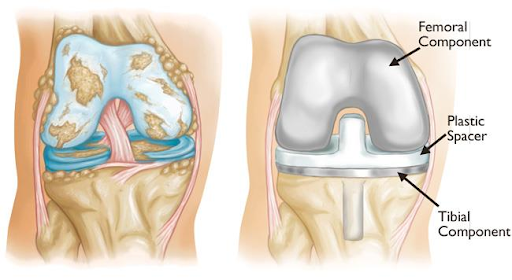Knee replacement is one of the most common and successful orthopedic procedures for patients suffering from severe knee pain, arthritis, restricted mobility, or joint damage due to injury. While many people focus on the surgery itself, one of the biggest determinants of success is choosing the right hospital. The right medical facility can make a tremendous difference in surgical results, comfort, recovery speed, and overall patient experience.
For many patients and their families, selecting the best hospital may feel overwhelming. They often wonder:
- What makes one hospital better than another?
- Which factors matter most?
- How do I compare experts and hospitals?
- What should I ask before finalizing the surgery?
This article takes a patient-friendly approach and simplifies everything you need to know to make a confident and informed decision.
Why Hospital Choice Matters
Knee replacement is a major surgery, and even though modern techniques are highly successful, the quality of the hospital significantly affects:
- Surgical accuracy
- Infection control
- Post-surgery rehabilitation
- Pain management
- Patient comfort and satisfaction
- Long-term mobility and outcomes
A hospital with strong orthopedic infrastructure and experienced surgical teams is more likely to deliver smoother outcomes and fewer complications. Therefore, patients should evaluate a hospital on multiple fronts—not just proximity or cost.
Factors to Consider When Choosing a Knee Replacement Hospital
1. Doctor and Surgeon Expertise
The first and most important factor is the surgeon performing the procedure. Check for:
- Years of experience specifically in knee replacement
- Number of surgeries completed
- Success and revision rates
- Training and specialization
- Experience with robotic or minimally invasive procedures
Many high-performance hospitals have surgeons who specialize in joint replacement only, which often leads to better results.
2. Hospital Accreditations and Certifications
Accreditations prove that the hospital meets national and international standards of safety and care. Look for recognitions such as:
- NABH (India)
- JCI (International)
- ISO certifications
Accredited hospitals must maintain strict policies regarding surgical quality, infection prevention, and patient protection.
3. Availability of Advanced Technology
Modern hospitals use state-of-the-art tools that increase surgical precision and improve recovery. Some of the latest technologies include:
- Robotic-assisted knee replacement
- Computer navigation systems
- High-definition arthroscopy
- Digital imaging
- 3D surgical planning software
These allow the surgeon to align the implant more precisely, reduce surgical trauma, and promote faster healing.
4. Infection Control Standards
Infection risk is a key concern during knee replacement. A good hospital should offer:
- Dedicated orthopedic operating theaters
- Sterile protocols
- Air-filtering and laminar airflow systems
- Strict hygiene and disinfection guidelines
You can ask the hospital about:
- Post-operative infection rates
- Safety precautions
- Antibiotic policies
Hospitals transparent about their data usually follow strong protocols.
5. Rehabilitation and Physical Therapy Facilities
Successful knee replacement does not end in the operating room. Rehabilitation is critical for:
- Regaining knee movement
- Walking comfortably
- Strength rebuilding
- Preventing stiffness
A good hospital should have:
- In-house physiotherapy departments
- Dedicated rehabilitation experts
- Personalized recovery plans
- Support for both inpatient and outpatient therapy
Some hospitals even offer hydrotherapy or robotic physiotherapy systems for faster mobility recovery.
6. Availability of Multiple Implant Options
Different knee implants suit different patient needs. A reliable hospital will provide implant choices such as:
- Standard metal-plastic implants
- Ceramic or high-durability implants
- Gender-specific implants
- Customized implants
The surgeon should explain:
- Durability and lifespan
- Suitability based on age and activity
- Cost differences
A hospital that offers choices ensures you receive the best fit for your lifestyle.
7. Patient Reviews and Testimonials
Feedback from former patients is one of the most reliable indicators of hospital quality. Look for:
- Google reviews
- Hospital website testimonials
- Independent health forums
- Case studies
Pay attention to comments about:
- Recovery experience
- Staff behavior
- Hygiene
- Waiting time
- Post-surgery support
Positive and consistent feedback is a strong sign that the hospital is trustworthy.
8. Personalized Care and Patient Support
A major surgery can be stressful for both patients and families. The right hospital should offer:
- Transparent consultations
- Help with medical reports
- Guidance on pre-surgical preparation
- Dedicated patient coordinators
- Emotional and family support
Hospitals that spend time educating and preparing the patient often deliver smoother, complication-free recovery.
9. Cost Transparency and Budget Planning
Cost is an essential part of decision-making. Hospitals should provide clear and complete cost estimates including:
- Surgeon fees
- Hospital stay
- Implant cost
- Diagnostic tests
- Physiotherapy
- Medication
Patients should ask for a written breakdown to avoid surprises later. Many hospitals also provide packages that simplify billing and insurance processing. Some hospitals share comparative pricing, such as knee Replacement Surgery Cost In India, to help patients plan better and understand the value they’re getting.
Questions to Ask Before Selecting a Hospital
Before finalizing your choice, ask:
- How many knee replacements does the hospital perform yearly?
- Who will be my surgeon, and what is their experience?
- What type of implants are available?
- Which advanced technologies does the hospital use?
- How long will the recovery take?
- What are the hospital’s infection control protocols?
- What kind of rehabilitation support is provided?
A hospital that answers clearly and confidently is usually a good choice.
Also read about: Knock Knee Surgery Cost in Rohtak
Final Thoughts
Choosing the right hospital for knee replacement is one of the most important decisions you will make in your treatment journey. Instead of rushing, spend time comparing:
- Expertise
- Technology
- Patient experience
- Cost transparency
- Rehabilitation quality
- Infection control
A hospital that excels in these areas can offer:
- Better surgical precision
- A safer procedure
- Less pain
- Faster mobility
- Improved long-term results

